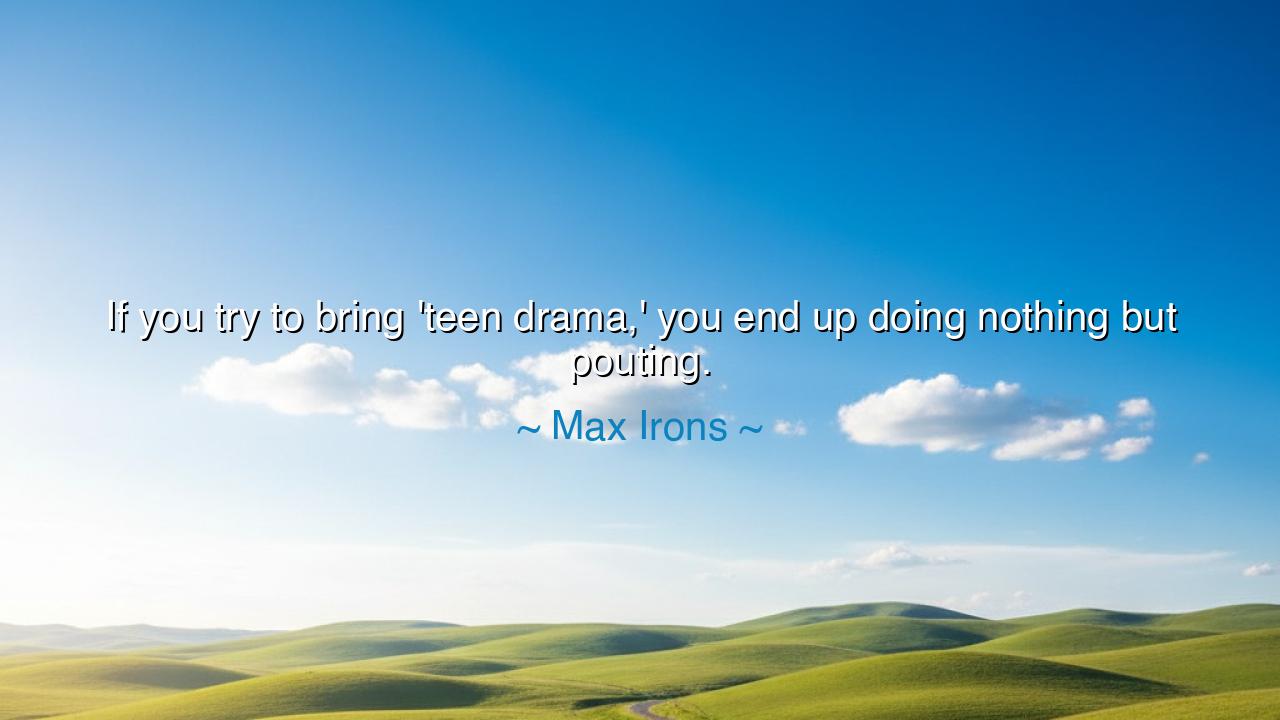
If you try to bring 'teen drama,' you end up doing nothing but






When Max Irons declared, “If you try to bring 'teen drama,' you end up doing nothing but pouting,” he offered a lesson not only for actors but for all who live and move within the theater of life. His words are sharp, almost playful, but beneath them lies a deeper warning: to mistake drama for depth, or posturing for passion, is to fall into emptiness. The pout becomes a mask, a hollow gesture, a shadow of true expression.
The origin of this thought lies in Irons’ work as an actor. Surrounded by roles and stories that often play to youthful emotion, he recognized the danger of falling into cliché. Teen drama, as he calls it, is too often a parade of sulking, exaggerated moods, and shallow conflict. But true storytelling requires more. It requires the vulnerability to show pain without artifice, joy without vanity, and struggle without theatrics. His words remind us that authenticity always outshines pretense.
History itself offers echoes of this truth. In the ancient tragedies of Sophocles and Euripides, the actors did not merely pout to show sorrow—they tore at their garments, cried out to the gods, and revealed the depths of the human condition. Their audiences were not moved by surface gestures, but by the rawness of suffering and the weight of choice. In contrast, lesser plays of the time were forgotten precisely because they offered only spectacle without substance. Even across centuries, we see that the difference between true drama and false drama lies in whether the soul is revealed.
Irons’ insight applies not only to the stage but to everyday life. How often do we, in our own struggles, fall into pouting—into sulking without action, complaint without courage? It is easy to wear the face of a victim, sighing and withdrawing, but such gestures change nothing. Real growth demands more: honesty, effort, and the strength to engage with life directly. Just as an actor must go beyond pouting to embody truth, so too must we go beyond complaint to embrace responsibility and transformation.
The deeper meaning here is that drama without depth is noise without music. To pout is to stop at the surface, to show only the shell of emotion without its heart. But the world does not need more hollow gestures—it needs real voices, authentic hearts, and genuine encounters. Whether in art, in relationships, or in one’s personal journey, the call is the same: abandon the empty mask and let your true spirit speak.
The lesson for future generations is clear: do not confuse appearances for reality. Do not settle for the pout when life asks for the cry, the song, the struggle, or the victory. In whatever you do—whether you tell a story, love another, or pursue a calling—bring forth your whole being. Do not play at drama; live with sincerity. Do not perform suffering; endure it with courage and transform it into wisdom.
Practical counsel flows: when you are tempted to sulk in the face of hardship, pause and ask yourself, Am I pouting, or am I engaging? If you are an artist, dig deeper than the superficial tropes of your craft—seek the truths that are hidden beneath. If you are simply walking through life, reject the temptation to dwell in shallow self-pity. Instead, act with honesty, with courage, and with presence.
Thus, let Max Irons’ words be remembered: to pout is to waste the moment, but to live truthfully is to honor it. Cast aside false drama and hollow gestures. Whether on the stage or in the soul, strive always for authenticity, for it is only when the heart speaks without mask that others are moved, and life itself becomes a work of art.






AAdministratorAdministrator
Welcome, honored guests. Please leave a comment, we will respond soon